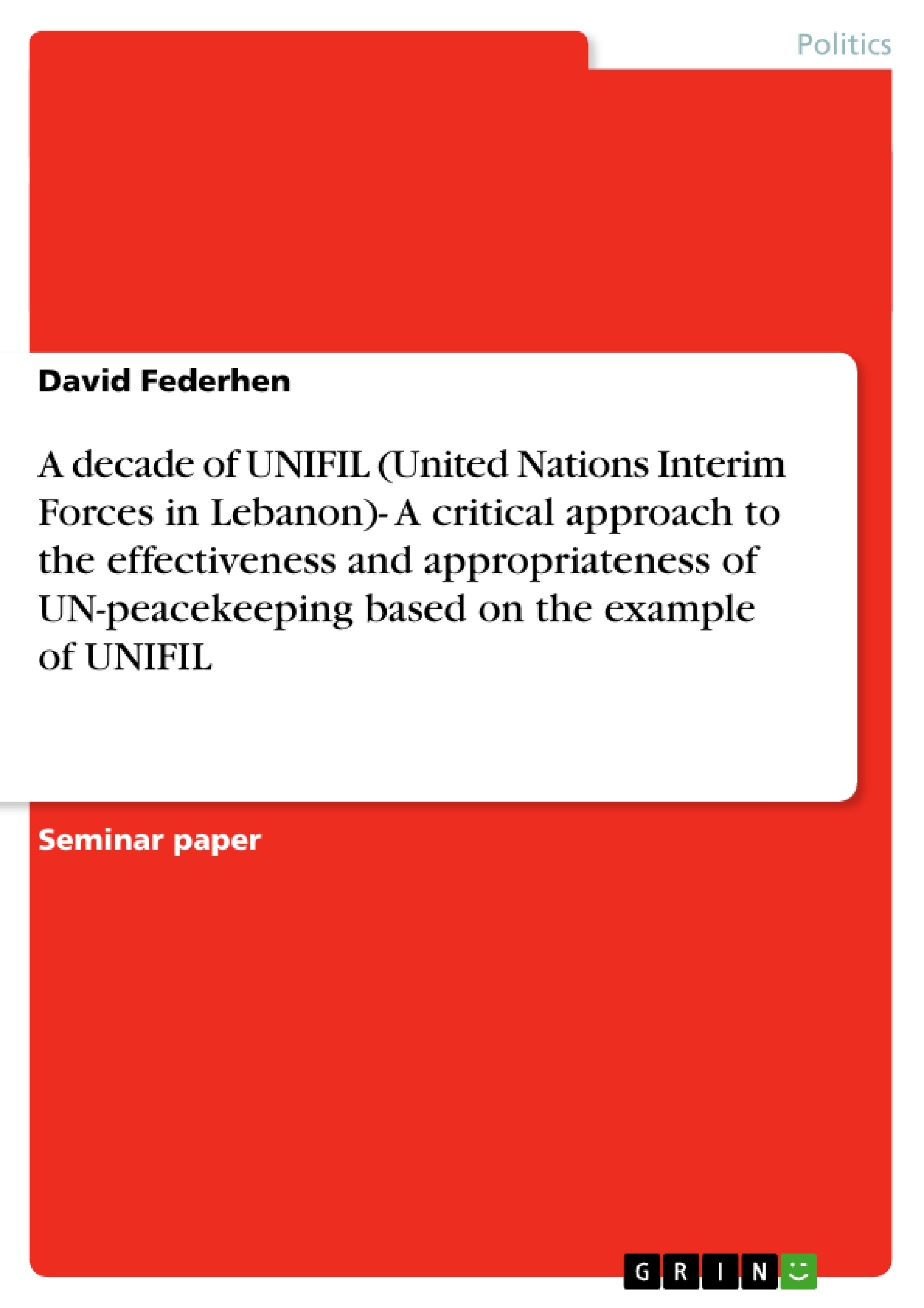This paper discusses the role of UN peacekeeping missions at the case of the United
Nations Interim Force in Lebanon (UNIFIL) by looking into its first ten years of
operation. The author comes to the conclusion that UNIFIL failed to achieve what it was
established for, but at the same time points out that inefficient or even ineffective UN
peacekeeping missions do nothing to undermine the general idea and justifiability of
peacekeeping as a measure for inter-state or infra-state conflict resolution. Since its formation in 1945, the United Nations Organization has engaged in numerous
peacekeeping missions around the world, the first of which was installed in 1956 to
resolve the Suez-crisis. Some of those missions have been concluded in rather short
periods of time. Others, as will become apparent throughout this text, have not been
concluded successfully even after decades. This text will critically discuss on the role and
effectiveness of UN peacekeeping missions by taking a closer look at the United Nations
Interim Force in Lebanon (UNIFIL) which was formed and consequently put into action
in 1978 – but has proved to be unable to fulfill its mandate until today. By analyzing the
case of UNIFIL the author will illustrate some of the major problems which impair such
peacekeeping missions from being concluded successfully, and eventually cause them to
last for decades.
For this purpose, the first part of this text will be dedicated to what constitutes an UN
peacekeeping mission. In the second part of this text the author will briefly provide
background information on UNIFIL and major events that took place between 1978 and
1988 – a period by itself considered long enough by the author to make a qualified
judgment about UNIFIL’s effectiveness since it was actually supposed to serve as “ ‘an
interim measure until the Government of Lebanon assumes its full responsibilities in
southern Lebanon’ ” (Thakur, 1987, p. 40). [...]
Table of Contents
- ABSTRACT
- INTRODUCTION.
- THE CONCEPT OF PEACEKEEPING...
- 2A. UNIFIL (1978-1988)...
- BACKGROUND..
- 2B. GOALS: INTENTION AND REALITY..
- CONFIRMING THE WITHDRAWAL OF ISRAELI FORCES..
- RESTORING INTERNATIONAL PEACE AND SECURITY..
- ASSISTING THE GOVERNMENT OF LEBANON IN ENSURING THE RETURN OF ITS EFFECTIVE AUTHORITY IN THE AREA..
- 3. UNIFIL CAUSES FOR FAILURE
- GENERAL PROBLEMS WITH UN PEACEKEEPING MISSIONS VALID FOR UNIFIL.
- a) The nature of UN peacekeeping missions..
- b) The principle of visibility and predictability.
- c) A lack of preparation and coordination.
- SPECIFIC PROBLEMS TO UNIFIL
- a) The political environment before the invasion in 1978..
- b) Lack of local consent..
- c) Peacekeeping in occupied territory..
- d) Shifting focus away from original goals..
- 4. CONCLUDING REMARKS ON UNIFIL
- REASONS...
- COULD HAVE BEEN DONE MORE TO COUNTER THE PROBLEMS?.
- 5. IMPLICATIONS OF THE UNIFIL CASE ON THE ROLE OF INTERNATIONAL PEACEKEEPING AT THE BEGINNING OF THE 21ST CENTURY.
- The concept of peacekeeping and its different forms, particularly inter-state and infra-state peacekeeping.
- The historical context of UNIFIL's deployment in 1978 and the events leading to its establishment.
- The objectives and challenges faced by UNIFIL in restoring peace and security in Lebanon.
- The causes for UNIFIL's perceived failure to achieve its goals, including both general problems with UN peacekeeping missions and specific issues related to UNIFIL's operation.
- The broader implications of the UNIFIL case for the role of international peacekeeping in the 21st century.
- The first chapter introduces the concept of peacekeeping, highlighting its evolving forms and significance within the United Nations framework. The author differentiates between inter-state and infra-state peacekeeping, emphasizing the latter's relevance to UNIFIL.
- The second chapter focuses on the background of UNIFIL, tracing the escalating tensions between Israel and the PLO in Lebanon during the 1970s. The author discusses Israel's invasion of Lebanon in 1978, the Lebanese government's response, and the UN Security Council's resolution leading to the establishment of UNIFIL. It also outlines UNIFIL's three primary objectives: ensuring Israeli withdrawal, restoring international peace and security, and supporting the Lebanese government in reasserting its authority.
- The third chapter delves into the reasons for UNIFIL's perceived failure to achieve its objectives. It examines general challenges faced by UN peacekeeping missions, including the inherent complexity of such operations, the importance of visibility and predictability, and the need for adequate preparation and coordination. It further explores specific obstacles encountered by UNIFIL, including the pre-existing political environment in Lebanon, the lack of local consent, the challenges of peacekeeping in occupied territory, and the potential for shifting priorities and objectives.
Objectives and Key Themes
This paper aims to critically assess the effectiveness and appropriateness of UN peacekeeping missions by focusing on the case of the United Nations Interim Force in Lebanon (UNIFIL) during its first ten years of operation. The author analyzes the challenges faced by UNIFIL and examines whether it successfully fulfilled its mandate.
Chapter Summaries
Keywords
This text focuses on the role of UN peacekeeping missions, particularly the United Nations Interim Force in Lebanon (UNIFIL), in the context of international politics and conflict resolution. Key themes include the challenges and limitations of peacekeeping, the importance of local consent, the complexities of operating in occupied territories, and the potential for shifting political agendas to impact peacekeeping operations.
- Quote paper
- David Federhen (Author), 2004, A decade of UNIFIL (United Nations Interim Forces in Lebanon)- A critical approach to the effectiveness and appropriateness of UN-peacekeeping based on the example of UNIFIL, Munich, GRIN Verlag, https://www.grin.com/document/26777




